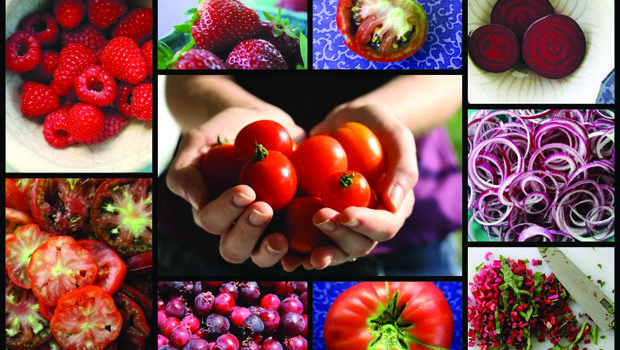The Role of Phytochemicals For Health
by Alexandra Senatore
It is clear that health and diet have declined tremendously over the past decade as fast-food giants have multiplied and general physical activity has lessened. As a result of the hazardous duo of poor diet and a lethargic state, the rise of diabetes in relation to obesity has increased by 10 percent from 1997 to 2007. Today, one in 10 Americans has diabetes. As projected by the New England Journal of Medicine, it is believed that the United States will be facing dwindling lifespans in the 21st century, shortening with each passing generation.
The American Cancer Society, while studying the global cancer epidemic, has found that the three leading causes of death worldwide are cardiovascular disease, Type 2 diabetes (as a result of obesity) and cancer. What is most troubling is that these illnesses have all been found to be food-related. This means, more often than not, we are completely in control of our risk factors for these detrimental health issues. Even carcinogens can be warded off and eradicated with antioxidants and beneficial nutrients in plants to inhibit tumor growth. This is a call to action to take control of what we put into our bodies. With conscious and informed eating habits, our health and overall quality of life is at our own disposal. The answer to the decline in health is in the produce section on the outskirts of supermarket aisles: phytochemicals, or the natural chemical compounds found in plants.
Fresh organic produce, with little manipulation, can be a wonderful thing, not to mention that these items are packed with phytochemicals. We do not have to completely compromise what we love to eat, but there are alternatives; a diet centered around plants is ideal as attested by ChooseMyPlate.gov. Our taste buds are just so adapted saturated fats, modified starches and highly processed sugars that we have forgotten how to truly nourish ourselves. Lacking the motivation to maintain a nutrient-dense diet rich in fruits and vegetables, some of us opt for essential vitamin and mineral supplements.
Alternatively, what if we knew how to obtain specific antioxidants from plants and used these components to prevent obesity, reduce the risk of every known cancer, lower the risk of diabetes and maintain cardiovascular health without needing to supplement? It is more than possible. We must learn to view opening the refrigerator door as if we were the opening our medicine cabinet.
The allium family, more commonly known as the edible bulbs of the plant world includes garlic, onion, shallots, scallions and leeks. Allium is known to prevent breast and colon cancer, while also promoting longevity. Diallyl sulfides are also found in this category of produce, which greatly boost immunity. Anthocyanins are the most exclusively studied and have demonstrated promising health benefits such as negating free radicals (highly reactive and dangerous atoms in the body). They also greatly contribute to heart health, vision and brain function by decreasing LDL cholesterol.
Beta-carotene is found in all orange fruits and vegetables, such as orange citrus fruits, butternut squash, sweet potatoes and carrots, and has proven effective in reducing cell damage from free radicals. Limonene is especially useful for detoxifying the liver of potential cancerous cells which may occur in people with prolonged alcohol use that many have internal scarring. Limonene can be found in citrus oils, and can be incorporated in the diet by zesting these fruits.
Lutein is the miracle compound in all dark green vegetables notorious for improving eye health. Lycopene, a component found in blush red plants such as tomatoes, guava, grapefruit and watermelon, is widely known to prevent prostate cancer and maintain bone health. Proanthocanidins assist in promoting urinary tract health, and are known to be found in cranberries, cocoa, cinnamon, wine, strawberries and peanut skins.
There are two other additional major functional components of food that have proven beneficial but do not fall into the category of phytochemicals. There are prebiotics, or indigestible fiber that acts as food for the good bacteria in our gut. One known prebiotic is inulin, which helps aid gastrointestinal digestion. Seek whole grains, flax, greens and legumes to implement them in the diet. The other component is probiotics, which are the healthy bacteria that also improve gastrointestinal health while increasing calcium absorption. These are namely found in fermented foods (kimchee or sauerkraut) and cultured dairy such as yogurt.
By simply consuming foods with benefits that match our health concerns, we can begin to take personal steps toward preventing obesity, diabetes, hypertension, osteoporosis and cancers in our bodies. Our overall health is more manageable than we have perceived it to be in the past, and in taking steps to ameliorate our physical condition and adapt to a healthy state of mind, we will find unparalleled long-term rewards through providing the body with true nourishment. The transition to fresh and predominantly raw fruits and vegetables will not only help us heal, but also decrease the risk of attributing further sickness in our lifetime.
Alexandra Senatore is a graduate of the Culinary Institute of America and is currently pursuing a degree in clinical dietetics and a registered dietician’s certification. For more information, visit WellnessAsAWeapon.Tumblr.com.




























